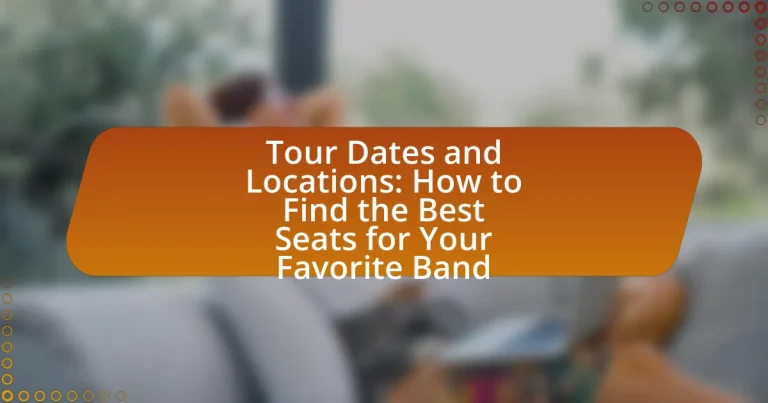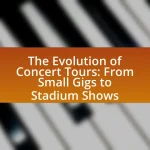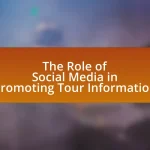Tour dates and locations are critical components of concert planning, detailing when and where artists perform. This article explores how these factors influence concert attendance, fan engagement, and the overall experience. It examines the selection process for tour dates, the impact of venue accessibility, and strategies for fans to secure tickets and optimal seating. Additionally, it provides resources for tracking tour dates and highlights best practices for attending concerts, ensuring fans are well-prepared for live performances.
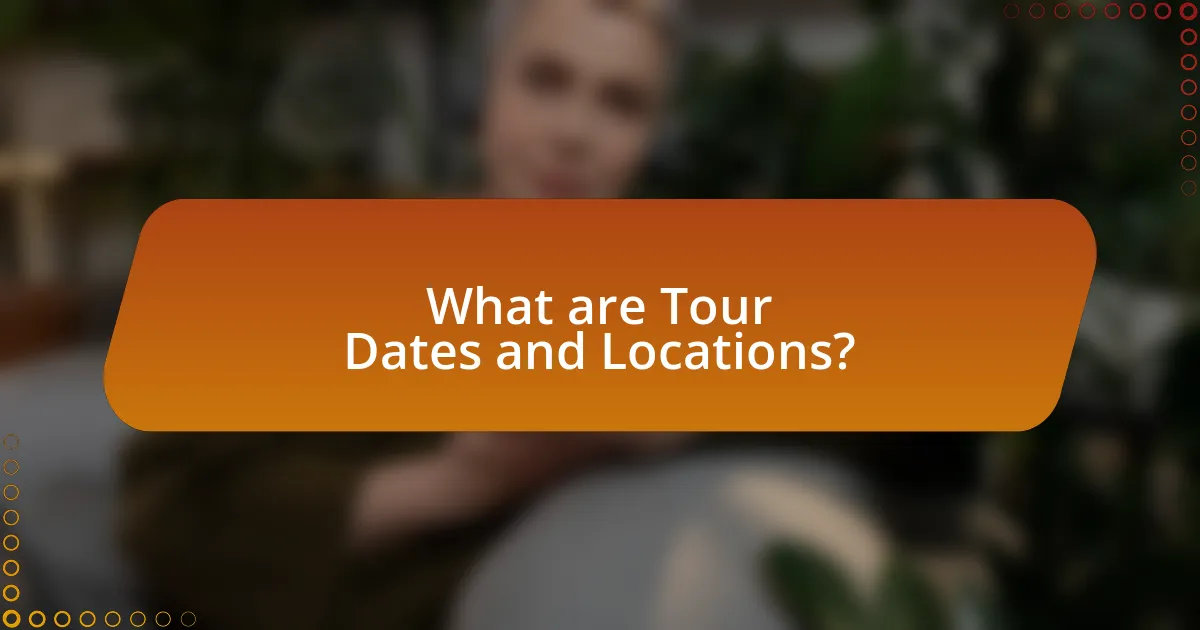
What are Tour Dates and Locations?
Tour dates and locations refer to the specific dates and venues where an artist or band will perform during a concert tour. These details are essential for fans to plan their attendance, as they indicate when and where they can see their favorite performers live. For instance, a band may announce a tour schedule that includes multiple cities, such as New York on June 5, Los Angeles on June 10, and Chicago on June 15, allowing fans to choose the most convenient location and date to attend.
How do Tour Dates and Locations impact concert attendance?
Tour dates and locations significantly impact concert attendance by influencing fans’ ability to attend based on timing and accessibility. For instance, concerts scheduled during weekends or holidays typically attract larger crowds due to fewer scheduling conflicts for potential attendees. Additionally, locations that are easily accessible via public transportation or are situated in populous urban areas tend to see higher attendance rates. A study by the National Endowment for the Arts found that concerts in metropolitan areas had attendance rates up to 30% higher than those in rural settings, highlighting the importance of location in drawing larger audiences.
What factors influence the selection of Tour Dates?
The selection of tour dates is influenced by several key factors, including artist availability, venue scheduling, market demand, and seasonal considerations. Artist availability is crucial as it determines when performers can tour without conflicting with other commitments. Venue scheduling impacts the selection as venues have limited availability and may host multiple events. Market demand is assessed through ticket sales data and fan engagement, guiding decisions on where and when to perform. Seasonal considerations, such as holidays or local events, can also affect the timing of tours to maximize attendance and revenue.
How do Locations affect the overall concert experience?
Locations significantly affect the overall concert experience by influencing acoustics, accessibility, and atmosphere. For instance, venues with optimal acoustics enhance sound quality, allowing audiences to enjoy music as intended by the artists. Accessibility impacts attendance; locations near public transport or with ample parking facilitate easier access for concertgoers. Additionally, the atmosphere created by the venue—such as an intimate setting versus a large stadium—can shape audience engagement and emotional connection to the performance. Studies show that concerts in smaller venues often yield higher audience satisfaction due to closer proximity to performers and a more personal experience.
Why are Tour Dates and Locations important for fans?
Tour dates and locations are crucial for fans because they determine when and where they can experience live performances by their favorite artists. Fans rely on this information to plan their attendance, often traveling significant distances to see shows. For instance, a survey by Eventbrite found that 78% of concertgoers prioritize knowing the tour schedule to make travel arrangements and secure tickets in advance. This highlights the importance of timely and accurate tour information for fan engagement and participation in live events.
How do fans plan their attendance around Tour Dates?
Fans plan their attendance around tour dates by closely monitoring the schedule released by the artists or their management. They typically check official websites, social media platforms, and ticketing services for announcements regarding dates and locations. Once the tour dates are confirmed, fans often prioritize their attendance based on factors such as proximity to the venue, availability of tickets, and personal schedules. For instance, a survey by Ticketmaster indicated that 70% of concertgoers consider travel distance and timing when deciding to attend an event. This strategic planning ensures that fans can secure tickets and make necessary arrangements, such as travel and accommodation, well in advance of the concert.
What role do Locations play in fan engagement?
Locations play a crucial role in fan engagement by providing a physical space where fans can connect with their favorite artists and each other. The choice of venue influences the overall experience, as factors like accessibility, capacity, and atmosphere can enhance or detract from fan enjoyment. For instance, a study by the Music Venue Trust indicates that smaller, intimate venues often foster a stronger sense of community among fans, leading to increased loyalty and engagement. Additionally, the geographical location can affect attendance rates, with fans more likely to engage when events are held in familiar or easily reachable areas.

How can you find Tour Dates for your favorite band?
To find tour dates for your favorite band, visit their official website or social media pages, as these platforms typically provide the most accurate and up-to-date information. Many bands also list their tour dates on ticketing websites like Ticketmaster or Live Nation, which aggregate concert information. Additionally, music news websites and apps like Songkick or Bandsintown can notify you of upcoming shows based on your preferences. These sources are reliable because they often have direct partnerships with artists and venues, ensuring the information is current and verified.
What resources are available for tracking Tour Dates?
Various resources are available for tracking tour dates, including official artist websites, ticketing platforms, and social media channels. Official artist websites typically provide the most accurate and up-to-date information regarding tour schedules and locations. Ticketing platforms like Ticketmaster and Live Nation aggregate tour dates and allow users to purchase tickets directly. Additionally, social media platforms such as Facebook and Instagram often feature event announcements and updates from artists, making them valuable for real-time tracking of tour dates.
How do official band websites provide Tour Date information?
Official band websites provide Tour Date information by listing upcoming concert dates, locations, and venues on a dedicated section of their site. This information is typically organized chronologically, allowing fans to easily find details about each event. Many official websites also include links to purchase tickets directly, ensuring that fans have a streamlined process for securing their seats. Additionally, these websites may offer features such as interactive maps of venues and options to sign up for alerts regarding new tour announcements or changes to existing dates. This structured presentation of information helps fans stay informed and engaged with the band’s touring schedule.
What are the benefits of using ticketing platforms for Tour Dates?
Using ticketing platforms for tour dates offers several benefits, including convenience, access to real-time availability, and enhanced security for transactions. These platforms streamline the ticket purchasing process, allowing fans to easily search for and secure tickets from various events in one location. Additionally, ticketing platforms often provide features such as seat selection, price comparisons, and notifications for ticket releases, which enhance the overall user experience. Security measures, such as encrypted transactions and verified sellers, help protect consumers from fraud, ensuring a safer purchasing environment.
How can social media help in finding Tour Dates?
Social media platforms facilitate the discovery of tour dates by providing real-time updates directly from artists and promoters. Many musicians and bands utilize platforms like Twitter, Instagram, and Facebook to announce their tour schedules, share ticket links, and engage with fans. For instance, artists often post stories or updates about upcoming concerts, which can be instantly accessed by followers. Additionally, social media allows fans to join groups or follow pages dedicated to specific artists, where tour information is frequently shared and discussed, enhancing the likelihood of receiving timely notifications about new tour dates.
What platforms are most effective for following band announcements?
Social media platforms, particularly Instagram and Twitter, are the most effective for following band announcements. These platforms allow bands to communicate directly with fans in real-time, providing updates on tour dates, new releases, and special events. For instance, a study by the Pew Research Center indicates that 69% of adults in the U.S. use social media, making it a prime channel for artists to reach their audience. Additionally, platforms like Facebook and TikTok also serve as effective tools for bands to share announcements and engage with their fanbase, further enhancing their visibility and interaction.
How can fan communities assist in sharing Tour Date information?
Fan communities can assist in sharing Tour Date information by leveraging social media platforms and dedicated forums to disseminate updates quickly and efficiently. These communities often have members who actively monitor official announcements and can share this information in real-time, ensuring that fans are informed about new tour dates as soon as they are released. For instance, platforms like Twitter and Facebook allow for rapid sharing and engagement, which can amplify the reach of tour announcements. Additionally, fan-created websites and newsletters can serve as centralized resources for tour information, providing fans with easy access to dates, locations, and ticketing details. This collaborative effort among fans enhances the overall awareness and accessibility of tour information, benefiting the entire community.
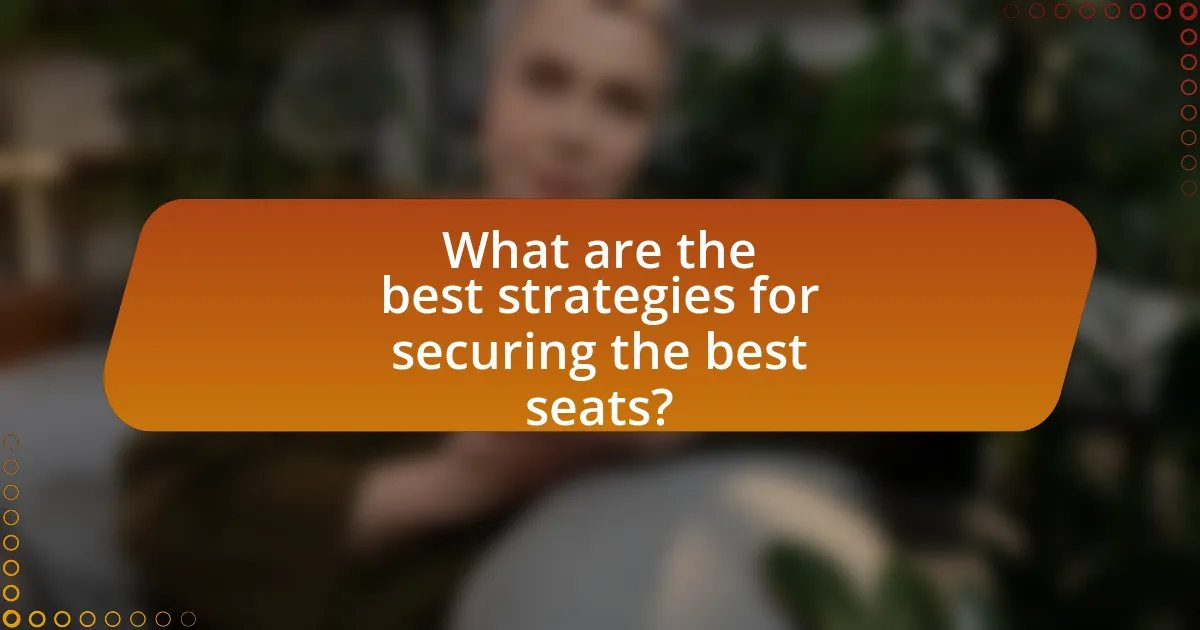
What are the best strategies for securing the best seats?
The best strategies for securing the best seats include purchasing tickets as soon as they become available, utilizing presale codes, and leveraging technology such as ticketing apps that provide real-time updates. Buying tickets immediately upon release increases the likelihood of obtaining prime seating, as popular events often sell out quickly. Presale codes, often provided to fan clubs or mailing lists, grant early access to tickets, allowing fans to secure better seats before the general public. Additionally, ticketing apps can notify users of seat availability and price drops, enhancing the chances of finding desirable seats. These strategies are supported by data indicating that early ticket buyers have a significantly higher success rate in securing optimal seating arrangements.
How can you determine the best seating options for a concert?
To determine the best seating options for a concert, evaluate the venue layout, ticket pricing, and personal preferences for sound quality and visibility. Analyzing the seating chart of the venue reveals sections that provide optimal views and acoustics; typically, seats located in the center and closer to the stage offer the best experience. Additionally, ticket prices often correlate with seat location, where premium seats are positioned for enhanced sound and sightlines. Research indicates that audience members generally prefer seats within the first 10 rows for better engagement and sound clarity, as supported by studies on concert acoustics and audience satisfaction.
What factors should you consider when choosing seats?
When choosing seats for a concert, consider factors such as location, view, acoustics, and comfort. The location of the seats affects proximity to the stage, which can enhance the overall experience. Seats closer to the stage typically provide a more immersive experience, while those further away may offer a broader view of the entire performance. Acoustics play a crucial role; certain areas in a venue may have better sound quality due to the design and layout. Additionally, comfort is important, as some venues offer more spacious seating than others, impacting your enjoyment during the event.
How do different venues affect seating arrangements?
Different venues significantly influence seating arrangements due to their size, layout, and design. For instance, large stadiums typically employ tiered seating to maximize capacity and provide sightlines, while smaller theaters may use a more intimate, flat seating arrangement to enhance audience engagement. Additionally, the presence of features such as stages, screens, and acoustics can dictate how seats are positioned; for example, venues with a central stage often have a circular or semi-circular seating layout to ensure visibility from all angles. Historical data shows that venues like Madison Square Garden utilize a combination of fixed and flexible seating to accommodate various events, impacting the overall experience for attendees.
What tips can help you secure tickets for popular concerts?
To secure tickets for popular concerts, utilize multiple ticketing platforms and set up alerts for ticket releases. Research shows that using platforms like Ticketmaster, Live Nation, and AXS increases your chances, as they often have exclusive pre-sales and notifications for fans. Additionally, creating accounts in advance and saving payment information can expedite the checkout process, which is crucial during high-demand sales. According to a study by Eventbrite, 70% of successful ticket buyers had alerts set up for their desired events, highlighting the effectiveness of proactive measures.
How does timing affect your chances of getting tickets?
Timing significantly affects your chances of getting tickets by determining when you attempt to purchase them. For instance, tickets for popular events often sell out quickly after their release, so being among the first to buy when they go on sale increases your likelihood of securing a seat. Additionally, purchasing tickets during presale events or at specific times when demand is lower can enhance your chances, as fewer buyers are competing for the same tickets. Statistics show that tickets for major concerts can sell out within minutes, emphasizing the importance of timing in the purchasing process.
What are the advantages of presale tickets?
Presale tickets offer several advantages, primarily ensuring early access to popular events. This early access allows fans to secure seats before the general public, reducing the risk of sellouts. Additionally, presale tickets often provide access to exclusive seating options or packages that may not be available later. According to a survey by Eventbrite, 60% of attendees prefer purchasing presale tickets to guarantee their spot at high-demand events, highlighting the value fans place on this option.
What are common pitfalls to avoid when buying concert tickets?
Common pitfalls to avoid when buying concert tickets include purchasing from unofficial sources, failing to check the venue’s seating chart, and ignoring ticket release dates. Buying from unofficial sources can lead to counterfeit tickets, as verified by the Better Business Bureau, which reports that many consumers have lost money to scams. Not checking the venue’s seating chart may result in poor seat selection, as different sections offer varying views and experiences. Additionally, ignoring ticket release dates can lead to missing out on the best seats, as popular concerts often sell out quickly after tickets become available.
How can you identify and avoid ticket scams?
To identify and avoid ticket scams, purchase tickets only from authorized sellers and official websites. Scammers often create fake listings on secondary markets or social media, so verify the legitimacy of the seller by checking for reviews and ratings. Additionally, be cautious of prices that are significantly lower than the market value, as this is a common tactic used by fraudsters. According to the Better Business Bureau, consumers reported losing over $1.5 million to ticket scams in 2022, highlighting the importance of vigilance when buying tickets. Always use secure payment methods and avoid sharing personal information unless you are certain of the seller’s credibility.
What should you know about ticket refund policies?
Ticket refund policies vary by event organizer and ticket seller, so it is essential to review the specific terms before purchasing. Many organizations offer full refunds for canceled events, while others may only provide credits for future events or no refunds at all for rescheduled shows. For example, the Federal Trade Commission states that consumers are entitled to a refund if an event is canceled, but policies differ for postponed events. Understanding these nuances can help consumers make informed decisions when buying tickets.
What are the best practices for attending concerts?
The best practices for attending concerts include planning ahead, arriving early, and being mindful of personal safety. Planning ahead involves purchasing tickets in advance and researching the venue layout to identify optimal seating. Arriving early allows attendees to navigate the venue, find their seats, and enjoy any pre-show activities. Being mindful of personal safety includes staying aware of surroundings, following venue rules, and having a plan for emergencies. These practices enhance the concert experience and ensure a safer environment for all attendees.
How can you prepare for the concert day?
To prepare for the concert day, ensure you have your tickets ready, plan your transportation, and check the venue’s guidelines. Having your tickets accessible, whether printed or on a mobile device, prevents last-minute issues. Planning transportation, including parking or public transit options, helps avoid delays. Additionally, reviewing the venue’s rules regarding items allowed, entry times, and COVID-19 protocols ensures a smooth experience. These steps are essential for a successful concert outing.
What should you bring to ensure a great concert experience?
To ensure a great concert experience, you should bring essential items such as tickets, a fully charged mobile phone, ear protection, and comfortable clothing. Tickets are crucial for entry, while a charged phone allows for communication and navigation. Ear protection is important to safeguard your hearing from loud music, and comfortable clothing enhances your overall enjoyment during the event. These items collectively contribute to a more enjoyable and stress-free concert experience.
